#narrative meta
Text
ghhhhh the love, the weight, the tragedy, of looking at someone and saying "something bad will happen. we cant stop it. but come find us, after, and we will help." you cannot prevent the hurt, you cannot go back in time, you cannot reach into the pasts of your loved ones and turn the clock back. all you can do is promise to be there, after, all you can do is say "i will be here, after, okay? find us, we will be here, we will help you, we will be here to help. we'll be here to bring you home."
#critical role#cr spoilers#c3e37#ashton#laudna#imogen temult#😭😭😭#cr liveblogging#you CANT CHANGE THE PAST BUT YOU CAN PROMISE TO BE IN THEIR FUTURE. IN THE PRESENT.#my meta#character meta#love in critical role#narrative meta
3K notes
·
View notes
Text
listen, i have no idea what’s currently canon in dc comics and i really don’t care to BUT regardless of what continuity we’re in, i think jason todd might be the funniest character of all time. just the biggest hypocrite ever and i’m obsessed. like, so many people have pointed out how crazy it is to be pissed off at tim for replacing him as robin when he literally replaced dick while dick was still alive, but then to go and parade around bludhaven as a murderous nightwing while dick is (again) very much still alive and THEN form a team with dick’s ex girlfriend and best friend??? jason todd is THE definition of “replacement” or what the fuck ever he calls tim and i actually find it so funny. stay crazy girl <3
#not to mention the meta of it all#Jason’s original backstory being identical to dick’s because dc literally just NEEDED another robin#like my guy was intended to replace dick#that was his original narrative function#he’s unintentionally the funniest character ever#jason todd#red hood#robin#dc robin#robin and batman#dick grayson#nightwing#red hood and the outlaws#more like red hood and the in-laws#yes i know everyone’s made that joke before#tim drake#Red Robin#batman#dc comics#gotham#bludhaven#batfamily#batfam#dick and jason
3K notes
·
View notes
Text
the whole "it's boring to have the characters end up in heaven at the end" like, no it's not a boring ending and it's not what happened. they aren't in heaven, they are back inside of jughead's narration. they're teenagers forever. they're inside the story again. this whole season has had each and every character fighting their way out of the narrative they have been trapped inside, that jughead trapped them in, let them finally achieve that and gain their freedom only to die and end up back in the narrative again. they are back where they started.
7K notes
·
View notes
Text
missy doesn’t understand that she’s in the wrong genre. she believes she’s in a darkly alluring gothic romance instead of an optimistic sci-fi show. in her genre, gifting your estranged ex/enemy/lover/best friend/twin flame an indestructible undead army to prove to him that your will to power is identical is the most romantic gesture imaginable. it’s victory via surrender, it’s control through abdication. all her scheming to “corrupt” him, to demonstrate that they’re the same deep down, that his sanctimonious morality is nothing but a method of keeping his own conscience clean, that’s the hannibal gene, the lestat gene (*obviously the dynamics aren’t 1-to-1 similar, but… close enough) and missy’s tragedy in death in heaven is in that, within the narrative format she’s trapped in, she can never succeed
#dw#jamie catches up#death in heaven#missy#twissy#the narrative#thoschei#twelfth doctor#twelve#doctor who meta#dark water#doctor who series 8#the master
2K notes
·
View notes
Text
unfortunately for jon snow, the role of "dead girl haunting the narrative" is already occupied by his mother, father, brother, sister, uncle, grandmother and step mother x2 so he's going to have to be forcibly resurrected :/
#1000s dead girls haunting the narrative factoid statistical error#georg rrm who writes and kills hundreds of martyrs per book is a statistical outlier adn should not have been counted#asoiaf#jon snow#winds of winter#house stark#house targaryen#asoiaf meta#asoiaf shitpost
2K notes
·
View notes
Text
last night i watched the first episode in supernatural and within 10 minutes i put it on pause because in NO way, through the 15 seasons, should anyone be happy with how dean's story ends with him dying whilst hunting
because in the 10 minutes that ive learnt about him is that he's spent his entire life fighting, and he dies FIGHTING
no satisfying narrative ends like that, especially not for one thats run for 15 years
#dean winchester#supernatural#supernatural meta#destiel#deancas#doomed by the narrative#except its not the elizabethan era anymore so why the eff are there still tragedies#but also ive not watched any other episodes of supernatural#I think he deserved a chance for something more#happiness#is that what the kids call it these days?
2K notes
·
View notes
Text
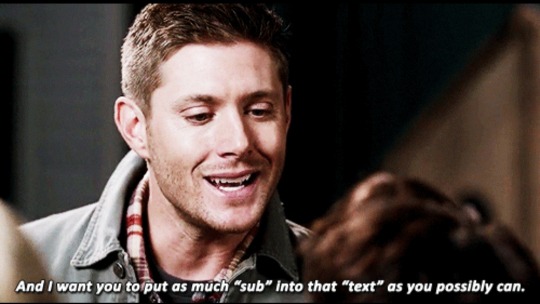
this is dean directly speaking to us with the fanfiction writing power and living outside of the narrative he's trapped in, asking us to do what chuck and the cw don't allow him to have
#spn#spn 10x05#fanfiction writing#destiel fanfiction#fanfic writing#fanfiction#dean x castiel#deancas#destiel#spn meta#supernatural#fanfic#spn fandom#dean winchester#like it's a direct plea#he wants us to create destiel fanfiction#notice how the camera is placed like he's diectly speaking to US in the girl's place?#spn writers who tried doing it are speaking through dean's words#dean the character is asking us to let his dreams come alive outside of the narrative he's can't escape from#and us... we're just gonna have to keep making his wish come true#let's keep writing pals#dean wants you to write destiel fics#he told us
2K notes
·
View notes
Text
Putting the Meta in "Metatron"
(couldn't resist the pun, sorry)
Ok, this has been tickling my brain for a while. I've been thinking about how The Metatron designed his role and discourse specifically to manipulate Aziraphale into the end result we saw in the last minutes of S2. I become obsessed with it because… well, I'm a bit obsessive, but also because there were many really smart writing decisions that I loved (even when I despise The Metatron exactly for the same reasons. Hate the character, love the writer). If you haven't watched Good Omens Season 2, this is the moment to stop reading. Come back later!
We already know that in Book Omens, the role of Gabriel in the ending was occupied by The Metatron. Of course, the series introduced us to Gabriel and we won a lot by that, but I feel that the origins of The Metatron should be considered for any of this. He is not a "sweet old man": he was the one in charge of seeing over the operation of Armageddon; not just a stickler of rules, but the main promoter for it.
However, when he appears in the series finale, we first are primed to almost pass him by. He is in the line for buying coffee, using clothes that are:
obviously not tailored (almost ill fitted)
in dark tones
looking worn and wrinkled
This seems so important to me! All the angels we have seen are so proud of their aspect, wear clear (white or off white) clothes, pressed, impeccable (even Muriel), even when they visit the Earth (which we have already seen on S1 with all the visits to the bookshop). The Metatron chose a worn, comfortable attire, instead. This is a humanized look, something that fools all the angels but which would warm up someone very specific, can you guess?
After making quite a complicated coffee order (with sort of an affable and nervous energy), he makes a question that Crowley had already primed for us when asking Nina about the name of the coffee: having a "predictable" alternative and an unpredictable one.
This creates an interesting parallel with the next scene: Michael is discussing the possibility of erasing Aziraphale from The Book of Life (a punishment even worse than Holy Water on demons, because not having existed at all, EVER is definitely worse than having existed and ceased to exist at some point) when The Metatron arrives, interrupts the moment and signals having brought coffee. Yup, an amicable gesture, but also a "not death" offering that he shows clearly to everyone (even when Michael or Uriel do not understand or care for it. It wasn't meant for them). He even dismisses what Michael was saying as "utter balderdash" and a "complete piffle", which are the kind of outdated terms we have heard Aziraphale use commonly. So, The Metatron has put up this show for a specific audience of one.
The next moment on the script has Metatron asking Crowley for the clarification of his identity. Up to this moment, every angel has been ignoring the sprawled demon in the corner while discussing how to punish Aziraphale… But The Metatron defers to the most unlikely person in the room, and the only one who will push any buttons on Aziraphale: Crowley. After that, Aziraphale can recognize him, and Metatron dismisses the "bad angels" (using Aziraphale's S1 epithet) with another "catchy old phrase", "spit spot", while keeping Muriel at the back and implying that there is a possibility to "check after" if those "bad angels" have done anything wrong.
Up to this moment, he has played it perfectly. The only moment when he loses it is when he calls Muriel "the dim one", which she ignores… probably because that's the usual way they get talked to in Heaven. I'm not sure if Aziraphale or Crowley cared for that small interaction, but it is there for us (the audience) to notice it: the sympathy the character might elicit is built and sought, but he is not that nice.
After that, comes "the chinwag" and the offer of the coffee: the unnecessarily complicated order. It is not Aziraphale's cup of tea (literally), but it is so specific that it creates some semblance of being thought with care, and has a "hefty jigger" of syrup (again with the funny old words). And, as Aziraphale recognizes, it is "very nice!" (as The Metatron "jolly hoped so"), and The Metatron approves of him drinking it by admitting he has "ingested things in my time, you know?". This interaction is absolutely designed to build a bridge of understanding. The Metatron probably knew that the first response he would get was a "no", so he tailored his connection specifically to "mirror" Aziraphale: love of tasty human treats he has also consumed, funny old words like the ones he loves, a very human, worn, well-loved look. That was the bait for "the stroll": the moment when Aziraphale and Crowley get separated, because The Metatron knew that being close to Crowley, Aziraphale would have an hypervigilant soundboard to check the sense of what he was going to get offered. That's what the nasty look The Metatron gives to Crowley while leaving the bookshop builds (and it gets pinpointed by the music, if you were about to miss it).
The next thing we listen from The Metatron is "You don't have to answer immediately, take all the time you need" in such a friendly manner… we can see Aziraphale doubting a little, and then comes the suggestion: "go and tell your friend the good news!". This sounds like encouragement, but is "the reel". He already knows how Crowley would react, and is expecting it (we can infer it by his final reaction after going back for Aziraphale after the break up, but let's not get ahead of ourselves shall we?). He even can work up Muriel to take care of the bookshop while waiting for the catch.
What did he planted in Aziraphale's mind? Well, let's listen to the story he has to tell:
"I don't think he's as bad a fellow… I might have misjudged him!" — not strange in Aziraphale to have such a generous spirit while judging people. He's in a… partnership? relationship? somethingship? with a demon! So maybe first impressions aren't that reliable anyway. The Metatron made an excellent job with this, too.
"Michael was not the obvious candidate, it was me!" — This idea is interesting. Michael has been the stickler, the rule follower, even the snitch. They have been rewarded and recognized by that. Putting Aziraphale before Michael in the line of succession is a way of recognizing not only him, but his system of values, which has always been at odds with the main archangels (even when it was never an open fight).
"Leader, honest, don't tell people what they want to hear" — All these are generic compliments. The Metatron hasn't been that aware of Aziraphale, but are in line with what would have been said of any "rebel leader". They come into context with the next phrase.
"That's why Gabriel came to you, I imagine…" — I'm pretty sure The Metatron didn't imagine this, ha. He is probably imagining that the "institutional problem" is coalescing behind his back, and trying to keep friends close, but enemies closer… while dividing and conquering. If Gabriel rebelled, and then went searching for Aziraphale (and Crowley, they are and item and he knows it), that might mean a true risk for his status quo and future plans.
Heaven has great plans and important projects for you — this is to sweeten the pot: the hefty jigger of almond syrup. You will be able to make changes! You can make a difference from the inside! Working for an old man who feels strangely familiar! And who recognizes your point of view! That sounds like the best job offer of the world, really.
Those, however, are not the main messages (they are still building good will with Aziraphale); they are thought out to build the last, and more important one:
Heaven is well aware of your "de facto partnership" with Crowley…
It would be considered irregular if you wanted to work with him again…
You, and you alone, can bring him to Heaven and restore his full angelic status, so you could keep working together (in very important projects).
Here is the catch. He brought the coffee so he could "offer him coffee", but the implications are quite clear: if you want to continue having a partnership with Crowley, you two must come to Heaven. Anything else would be considered irregular, put them in a worst risk, and maybe, just maybe, make them "institutional enemies". Heaven is more efficient chasing enemies, and they have The Book of Life as a menace.
We already know how scared Aziraphale has always been about upsetting Heaven, but he has learned to "disconnect" from it through the usual "they don't notice". The Metatron came to tell him "I did notice, and it has come back to bite you". The implied counterpart to the offer is "you can always get death". Or even worse, nonexistence (we have already imagined the angst of having one of them condemned to that fate, haven't we?)
When The Metatron arrives, just after seeing Crowley leave the bookshop, distraught, he casually asks "How did he take it?", but he already knows. That was his plan all along: making them break up with an offer Aziraphale could not refuse, but Crowley could not accept. That's why he even takes the license to slightly badmouth Crowley: "Always did want to go his own way, always asking damn fool questions, too". He also arrive with the solution to the only objection Aziraphale would have: Muriel, the happy innocent angel that he received with so much warmth and kindness, is given the opportunity to stay on Earth, taking care of the bookshop. The only thing he would have liked to take with him is not a thing, and has become impossible.
If God is playing poker in a dark room and always smiling, The Metatron is playing chess, and he is quite good at it (that's why he loves everything to be predictable). He is menacing our pieces, and broke our hearts in the process… But I'm pretty sure he is underestimating his opponents. His awful remark of Muriel being "dim"; saying that Crowley "asks damn fool questions", and even believing that Aziraphale is just a softie that can be played like a pipe… That's why telling him the project is "The Second Coming" was an absolute gift for us as an audience, and it prefigures the downfall that is coming — the one Aziraphale, now with nothing to lose, started cooking in his head during that elevator ride (those couple of minutes that Michael Sheen gifted to all of us: the shock, the pain, the fury, and that grin in the end, with the eyes in a completely different emotion). Remember that Aziraphale is intelligent, but also fierce. Guildernstern commited a similar mistake in Hamlet, and it didn't go well:
"Why, look you now, how unworthy a thing you make of me! You would play upon me, you would seem to know my stops, you would pluck out the heart of my mystery, you would sound me from my lowest note to the top of my compass, and there is much music, excellent voice, in this little organ, yet cannot you make it speak. 'Sblood, do you think I am easier to be played on than a pipe? Call me what instrument you will, though you can fret me, you cannot play upon me."
I'm so excited to learn how this is going to unfold!! Because our heroes have always been very enthusiastic at creating plans together, failed miserably at executing them, and even then succeeding… But now they are apart, more frustrated and the stakes are even higher. Excellent scenario for a third act!
*exits, pursued by a bear*
#good omens#good omens 2#good omens meta#good omens spoilers#aziraphale#ineffable spouses#ineffable divorce#narrative analysis#character analysis#the metatron#and a casual Hamlet quote#just because I love Hamlet
2K notes
·
View notes
Text
oh my god all this time I believed that what fanon!Jason stans really wanted to read was Helena Bertinelli's books (because of all the relationships and interpersonal dynamics they keep stealing from her to project onto Jason) but what they actually should be reading are Catwoman books
Selina's the one who killed Black Mask and dismantled his operation after War Games. She's the one explicitly protecting the East End (aka Crime Alley) and going out of her way to protect the women and children of Gotham's underworld. She was the one doing mafia kingpin shit in the New 52 while Jason was off messing around in space with Dick's friends. She was the one protecting the Alleytown kids and trying to root out crime by "taking control" of it.
like Selina literally took over a crime family and united the criminal underworld in the New 52 while Jason was off fighting the All-Caste and Crux with Roy and Kory, I can't believe I didn't make the connection sooner
#yeah Helena is the one who has all of the relationships and interpersonal dynamics Jason stans keep stealing#but Selina is the one who has the JOB they keep insisting he fill#insane that I just FORGOT that Selina has that narrative niche cornered when I've been reading her comics for 15 years 😭#selina kyle#catwoman#jason todd#dc comics#selina kyle meta
942 notes
·
View notes
Text
Very interesting to me that a certain subset of the BES fandom's favourite iterations of Mizu and Akemi are seemingly rooted in the facades they have projected towards the world, and are not accurate representations of their true selves.
And I see this is especially the case with Mizu, where fanon likes to paint her as this dominant, hyper-masculine, smirking Cool GuyTM who's going to give you her strap. And this idea of Mizu is often based on the image of her wearing her glasses, and optionally, with her cloak and big, wide-brimmed kasa.
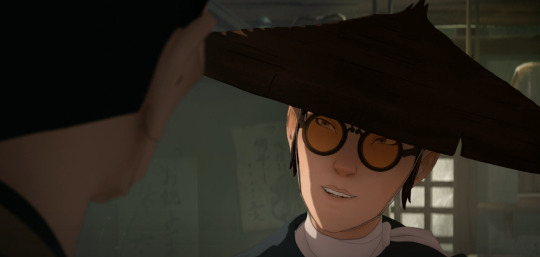

And what's interesting about this, to me, is that fanon is seemingly falling for her deliberate disguise. Because the glasses (with the optional combination of cloak and hat) represent Mizu's suppression of her true self. She is playing a role.

Take this scene of Mizu in the brothel in Episode 4 for example. Here, not only is Mizu wearing her glasses to symbolise the mask she is wearing, but she is purposely acting like some suave and cocky gentleman, intimidating, calm, in control. Her voice is even deeper than usual, like what we hear in her first scene while facing off with Hachiman the Flesh-Trader in Episode 1.
This act that Mizu puts on is an embodiment of masculine showboating, which is highly effective against weak and insecure men like Hachi, but also against women like those who tried to seduce her at the Shindo House.
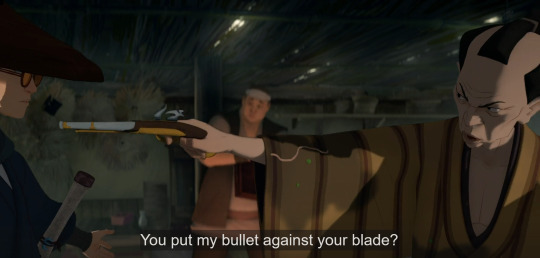

And that brings me to how Mizu's mask is actually a direct parallel to Akemi's mask in this very same scene.
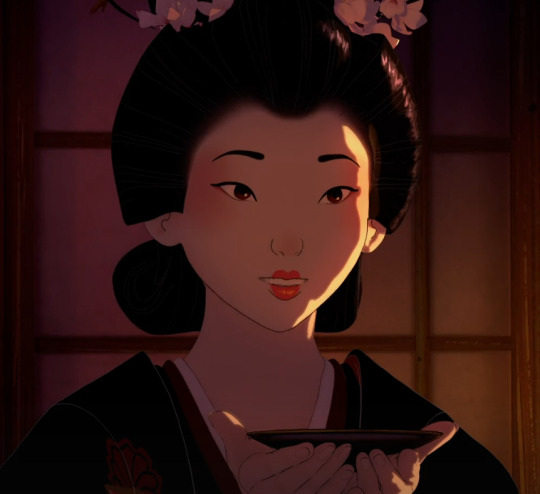
Here, Akemi is also putting up an act, playing up her naivety and demure girlishness, using her high-pitched lilted voice, complimenting Mizu and trying to make small talk, all so she can seduce and lure Mizu in to drink the drugged cup of sake.
So what I find so interesting and funny about this scene, characters within it, and the subsequent fandom interpretations of both, is that everyone seems to literally be falling for the mask that Mizu and Akemi are putting up to conceal their identities, guard themselves from the world, and get what they want.
It's also a little frustrating because the fanon seems to twist what actually makes Mizu and Akemi's dynamic so interesting by flattening it completely. Because both here and throughout the story, Mizu and Akemi's entire relationship and treatment of each other is solely built off of masks, assumptions, and misconceptions.
Akemi believes Mizu is a selfish, cocky male samurai who destroyed her ex-fiance's career and life, and who abandoned her to let her get dragged away by her father's guards and forcibly married off to a man she didn't know. on the other hand, Mizu believes Akemi is bratty, naive princess who constantly needs saving and who can't make her own decisions.
These misconceptions are even evident in the framing of their first impressions of each other, both of which unfold in these slow-motion POV shots.
Mizu's first impression of Akemi is that of a beautiful, untouchable princess in a cage. Swirling string music in the background.
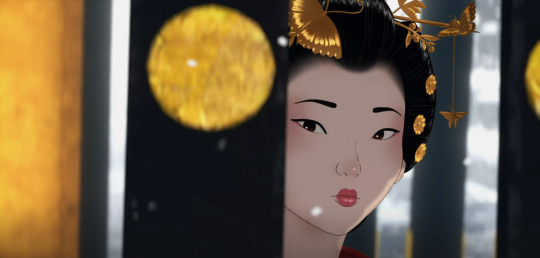
Akemi's first impression of Mizu is of a mysterious, stoic "demon" samurai who stole her fiance's scarf. Tense music and the sound of ocean waves in the background.

And then, going back to that scene of them together in Episode 4, both Mizu and Akemi continue to fool each other and hold these assumptions of each other, and they both feed into it, as both are purposely acting within the suppressive roles society binds them to in order to achieve their goals within the means they are allowed (Akemi playing the part of a subservient woman; Mizu playing the part of a dominant man).
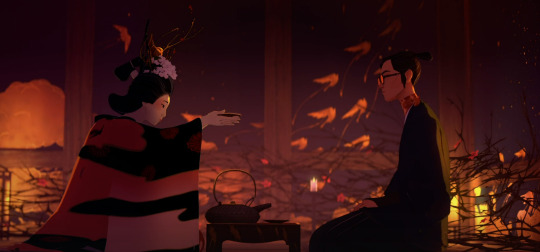
But then, for once in both their lives, neither of their usual tactics work.
Akemi is trying to use flattery and seduction on Mizu, but Mizu sees right through it, knowing that Akemi is just trying to manipulate and harm her. Rather than give in to Akemi's tactics, Mizu plays with Akemi's emotions by alluding to Taigen's death, before pinning her down, and then when she starts crying, Mizu just rolls her eyes and tells her to shut up.
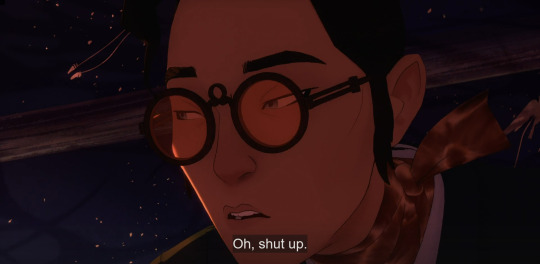
On the opposite end, when Mizu tries to use brute force and intimidation, Akemi also sees right through it, not falling for it, and instead says this:
"Under your mask, you're not the killer you pretend to be."
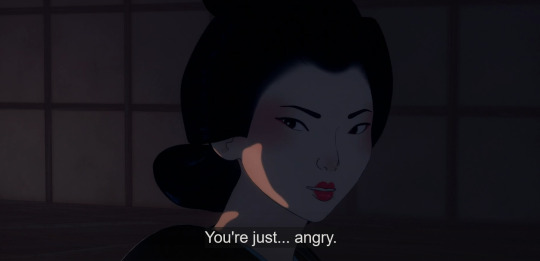
Nonetheless, despite the fact that they see a little bit through each other's masks, they both still hold their presumptions of each other until the very end of the season, with Akemi seeing Mizu as an obnoxious samurai swooping in to save the day, and Mizu seeing Akemi as a damsel in distress.
And what I find a bit irksome is that the fandom also resorts to flattening them to these tropes as well.
Because Mizu is not some cool, smooth-talking samurai with a big dick sword as Akemi (and the fandom) might believe. All of that is the facade she puts up and nothing more. In reality, Mizu is an angry, confused and lonely child, and a masterful artist, who is struggling against her own self-hatred. Master Eiji, her father figure who knows her best, knows this.
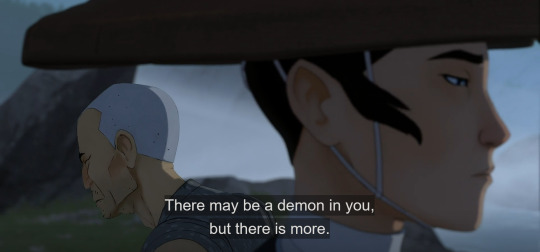
And Akemi, on the other hand, is not some girly, sweet, vain and spoiled princess as Mizu might believe. Instead she has never cared for frivolous things like fashion, love or looks, instead favouring poetry and strategy games instead, and has always only cared about her own independence. Seki, her father figure who knows her best, knows this.
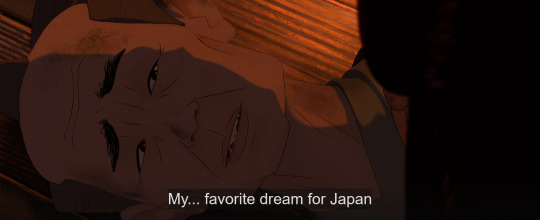

But neither is she some authoritative dominatrix, though this is part of her new persona that she is trying to project to get what she wants. Because while Akemi is willful, outspoken, intelligent and authoritative, she can still be naive! She is still often unsure and needs to have her hand held through things, as she is still learning and growing into her full potential. Her new parental/guardian figure, Madame Kaji, knows this as well.
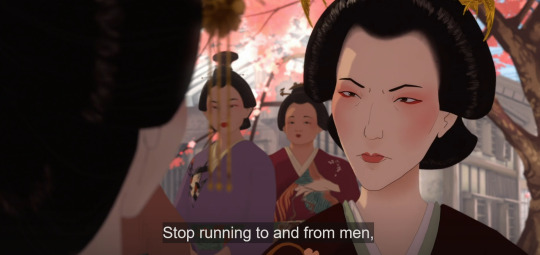
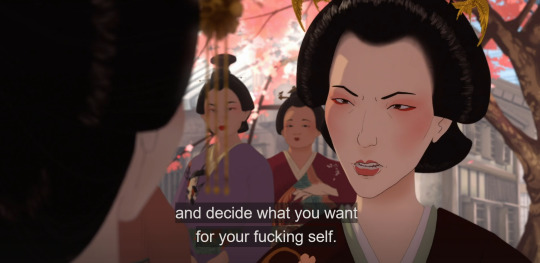
So with all that being said, now that we know that Mizu and Akemi are essentially wearing masks and putting up fronts throughout the show, what would a representation of Mizu's and Akemi's true selves actually look like? Easy. It's in their hair.
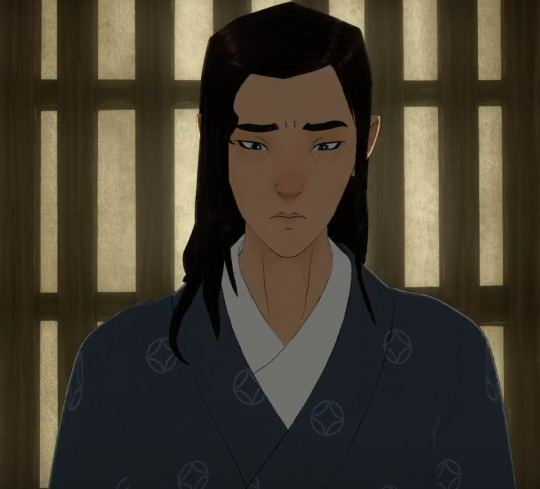

This shot on the left is the only time we see Mizu with her hair completely down. In this scene, she's being berated by Mama, and her guard is completely down, she has no weapon, and is no longer wearing any mask, as this is after she showed Mikio "all of herself" and tried to take off the mask of a subservient housewife. Thus, here, she is sad, vulnerable, and feeling small (emphasised further by the framing of the scene). This is a perfect encapsulation of what Mizu is on the inside, underneath all the layers of revenge-obsession and the walls she's put around herself.
In contrast, the only time we Akemi with her hair fully down, she is completely alone in the bath, and this scene takes place after being scorned by her father and left weeping at his feet. But despite all that, Akemi is headstrong, determined, taking the reigns of her life as she makes the choice to run away, but even that choice is reflective of her youthful naivety. She even gets scolded by Seki shortly after this in the next scene, because though she wants to be independent, she still hasn't completely learned to be. Not yet. Regardless, her decisiveness and moment of self-empowerment is emphasised by the framing of the scene, where her face takes up the majority of the shot, and she stares seriously into the middle distance.
To conclude, I wish popular fanon would stop mischaracterising these two, and flattening them into tropes and stereotypes (ie. masculine badass swordsman Mizu and feminine alluring queen but also girly swooning damsel Akemi), all of which just seems... reductive. It also irks me when Akemi is merely upheld as a love interest and romantic device for Mizu and nothing more, when she is literally Mizu's narrative foil (takes far more narrative precedence over romantic interest) and the deuteragonist of this show. She is her own person. That is literally the theme of her entire character and arc.
#blue eye samurai#mizu blue eye samurai#akemi blue eye samurai#blue eye samurai meta#just in case... im gonna tag this as#mizukemicritical#akemizucritical#though this post isnt actually criticising the ship itself but rather fanon's portrayal of the ship and the characters#for that reason lemme also tag this as#wank.mp3#feel free to disagree of course but please be civil#and if you need to rant about how wrong i am without any convincing evidence kindly feel free to make your own post. peace and love <3#fandom.rtf#meta dissertations.pdf#shut up haydar#edit: for full disclosure. i do rather dislike this ship. but obviously it's fine for anyone to enjoy it. please do! have your fun!#it's just that as usual! popular fanon and fandom around a ship is what has completely deterred me from any sense of enjoyment of it#it's a shame too because i was very open and even eager for some mizu/akemi romance in the future#but out-of-character fanon + the rudeness of certain fans has definitely soured it for me#but that doesn't mean people can't enjoy it obviously! ship and let ship!!!#plus it has its appeal which i DO STILL see and enjoy!!!!#i would even go as far as to call them soulmates because their narratives and characters are LITERALLY intertwined!!!#but. yeah. my gradual distaste for this ship is indeed very unfortunate.
670 notes
·
View notes
Text
Also: absolutely fantastic symbolism inversion, with the coming dawn spelling the time limit, touching down into a safe landing as a death knell. The light is cresting over the hills and we are horrified by it. The city is almost landed and we are hoping with all our hearts we have a little more time. The night is almost over, and once dawn comes, the world ends.
#critical role#cr spoilers#exandria unlimited#exu calamity#exu calamity part 4#exu spoilers#meta#spar speaks#cr liveblogging#my meta#narrative meta
2K notes
·
View notes
Text
maybe if I keep telling the story, it will never have to end. that way I can keep you alive. If the story lasts forever, so will you. yes, you die in the end. yes I am the only one who remembers. yes I am the only one who knows. But if I never say it aloud, maybe you won't die. maybe this time orpheus won't turn around. maybe peter won't deny him. maybe when I reach the end, you will have had time to come up with a clever solution and escape. maybe this time we survive it together. and the next time, you can tell this story with me. maybe everyone survives and we don't have to tell the story at all. maybe they don't. if I never finish, I'll never have to know. let me speak for a little bit longer. let me live in a world that you are also in for just a moment more. sometimes your memory feels like a noose. I'm sorry. I'm not ready for you to die
#words#i REALLY tried to write some izzy meta tonight and instead? i got ishmael#brain said 'lonely sailor with an I name? yeah i got u covered'#moby dick#ace txt#anyway it's about the DOOMED NARRATIVES#my askbox is ALWAYS open to talk about the narrative structure of moby dick it makes me want to chew thru drywall#my thoughts my words
19K notes
·
View notes
Text
something I find really interesting about hannibal’s character is how he uses people’s expectations and ingrained assumptions to hide himself. no one suspects he’s a serial killer because he doesn’t present as one. he’s elegant and refined and isn’t cruel to animals. he’s highly sophisticated, a polyglot and has a deep admiration for beauty and life. he appreciates saving lives just as much as he appreciates ending them. in fact, this particular aspect of his character is partly why it takes will the entirety of s1 to accept hannibal’s true nature. will saw hannibal save abigail and accompany her to the hospital in apéritif and he also saw hannibal save a man’s life by performing emergency surgery and taking over the operation at the end of sorbet.
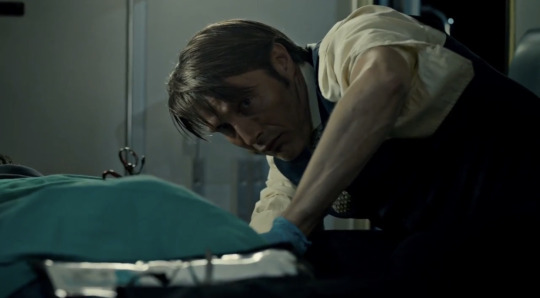
this moment in particular is interesting because of how it’s framed to make hannibal look almost godly from will’s point of view:
1) hannibal is positioned immediately higher than will due to being in the ambulance, meaning will is looking up at hannibal, while hannibal is looking down on him
2) hannibal is standing under a bright light as he works to save this guy’s life, while will is standing in almost complete darkness
3) the usual orchestral, classical music is playing in the background, emphasising the apparent “holiness” of the act and framing hannibal as some sort of saviour
the impact of this scene is even more potent when considering the context of the rest of the episode, since will has already stated that the ripper is not the type to save people or enact mercy on anyone. his style of murders doesn’t suggest this characteristic whatsoever, and although will’s assessment is correct, hannibal’s personality and overall demeanour doesn’t match what we’d imagine a person like that might look like. I think will is confronted by this as well, because even if hannibal’s surgical skill means he matches the ripper’s profile (which makes him a valid suspect) his actions contradict will’s image of the ripper, while simultaneously affirming it:

it’s difficult to reconcile these facets of hannibal’s character. it’s inherently contradictory and defies our cultural expectations. nonetheless, hannibal’s inclination to save people is sometimes more insidious than his murders. he doesn’t save people out of altruism, he does it because he thinks he’s superior and enjoys deciding outcomes. he doesn’t view himself as insane, he views himself as god. this is most aptly explored in takiawase, through the acupuncturist/beekeeper killer. here we see a murderer who confesses that she killed a man to quiet his mind, and tells jack that it’s beautiful that she managed to protect him and her other patients. this is one side of hannibal’s character, the one who’s a doctor and therapist and sees death as a cure from disease, even if the ‘disease’ itself is literally just discourtesy. it’s ultimately an act of power.
and yet in this same episode he flips a coin and saves bella on a whim. this of course is framed to others as an act of mercy, however the reality is he took bella’s power away in an act disguised as kindness. once again, he hides in plain sight. this is the other side of his character, and it’s just as deadly.
it’s still about power.
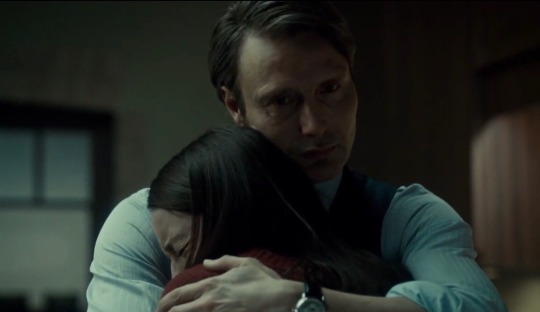
but we don’t associate acts of mercy with monstrosity. when hannibal comforts abigail in trou normand we question whether he’s as bad as we think, because what negative connotations are tied to paternal tenderness? we miss that hannibal is fostering dependency, that he literally looks dead in the eyes as he holds her, and that he blatantly just told us that he’s using abigail to manipulate will:

hannibal often does this actually. he either directly says what he’s doing or suggests that he’s the culprit (often through cannibal puns, as we know) but no one ever interprets him correctly because doing so would contradict the image he’s carefully constructed for himself. it would cause too much dissonance.
and what’s fascinating is that on a subtextual level this is largely what the show is about. the story is an exploration of societal roles and the struggle to fit into stiff categorisation and expectations. will parallels hannibal in this regard because he’s desperately trying to repress his identity by taking on certain roles. and the audience is lured by this persona the same way the characters are lured by hannibal because will defies our understanding of certain tropes. on a genre level, will assumes the detective archetype, meaning we are primed to think he’s inherently good. when we see him say he wants to save people we believe him, even though he often only does so to prove to himself that he’s a good person. will is indeed righteous, a characteristic we often view positively, however he’s violent, wrathful and actively enjoys murder due to how powerful it makes him feel. he’s not dissimilar to hannibal, we just don’t see this straight away because doing so would disrupt our understanding of good and evil.
will hides the same way hannibal does, except will hides from us as well
#ghostie once again goes on a tangent#but it’s so !! I really love how the show fucks with everyone#and uses our expectations to do it#even on a narrative/genre level#the key to unveiling it is letting that conditioning and urge to categorise everything go#also wow I’m back to writing meta hello there#nbc hannibal#hannibal#will graham#hannigram#hannibal meta#ghost speaks
2K notes
·
View notes
Text
You know, i've been thinking about the way Batman keeps danger and weapons so close to his body, so tight to himself, practically tied around his neck, that joker often has no way left but to grab for him if he wants something Batman has. Batman does not want to be left out of Joker's plans, his story, he wants in on Joker's narrative by any means he can make it happen. It's such particular "you take me with you wherever you are, it's your punishment, just as it's my punishment to take you with me wherever i am" statement. Batman actively leaves no choice for Joker but to get very very close to him and claim him as part of his win or his loss. I mean,
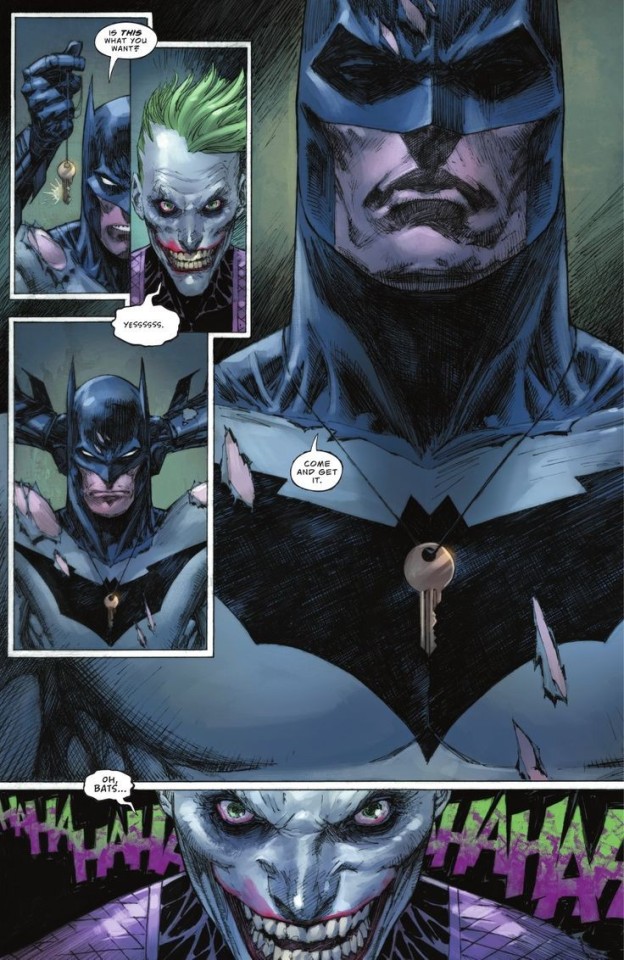
he didn't have to. he could've put the key in one of his waist pouches, push it into the back of his left boot, he could've tied it around his bicep, i dont care— he could've done whateverthefuck with it. But he had to put it around his neck, and intentionally invite Joker to "come and get it". Something something classic cliche of the way lovers' bond is signified by a necklace-adjacent item and the way they interact with it; hold unto it, toss it, tie it around their necks, giving it back, not giving it back, necklaces as items of reverance and revenge. Something something a tie around neck being a sign of being claimed and owned,
#this is the first night in 2 months where i got good sleep of course i woke up and had batjokes popping on my brain screen#''99+ unread emails'' style#the whole invitation thing is. certainly something#i mean bro. a ''you will take that wish to the grave with you'' would do just fine or#or ''you will not have it.''#Bruce wants his fights alright. He's uneasy with being left out of things often but he's particularly uneasy#with being left out of Joker's narrative#and it's far less about him ''being the only one strong enough to deal with him'' than he'd like to admit#batjokes#batjokes meta#Batman#Batman meta
413 notes
·
View notes
Text
one of the main reasons i love ofmd is the unapologetic queer joy they show us. there's not a single moment where the drama revolves around a character's "coming out" moment. there's no need to accept or reject anyone for what they identify as. like, for fuck's sake, there have been so many moments in the show where they explicitly tell us, "hey, this is us, take it or leave it." no explanations, no justifications—just pure, unfiltered representation. it truly drives in the point that at the end of the day, queer people are also just simply people.
as much as i appreciate the abundance of queer representation we're getting now, i cannot emphasize how much a show like ofmd means to me. i am begging more companies to do what ofmd is doing and just show queer people living as boring old fucking people instead of as victims. take us beyond existing as an educational tool or a plot device. show queer people being people, and we'll stop being victims.
"kill me. kill us all. our spirit will last throughout your entire fսckin' empire because... we're good." you know what this show teaches us? that queer people are resilient as fuck, and that whatever we may have been told, shown, and made to believe about our queerness is wrong. we're good. we continue to be good despite the hardships we face. despite all the shit our elders and trailblazers have gone through from the beginning. despite the political landscapes of today that continue to try to strip us of our dignity and rights. we still exist and we will continue to exist—as people first, and victims last.
#elio talks#ofmd#our flag means death#ofmd s2#ofmd season 2#lgbt#queer#izzy hands#gentlebeard#blackbonnet#ofmd meta#like.... guys i just cant stop thinking about this. sob#that quote has literally been burnt into my mind the moment i heard it#like. they really did that to us. FOR us#looked us straight in the eye and said 'you're good you know. don't believe the shit you've heard.'#'your queerness does not defile you.'#anyway. feeling v passionate about this#prob bc im also doing extensive research about queer and trans youth in the 'at-risk' narrative w my prof sdjgjsgs
730 notes
·
View notes
Text
not sally writing a whole show where shes an amazing mother supporting her kid out of an abusive relationship and then becoming abusive towards her real life kid. not telling her agent that she has 'more to bring to the table than breakfast' only to end up as a waitress in a breakfast bar. not barry spinning a narrative to his son about being a war hero and even naming himself after superman when his son doesnt even know his real name or that they're on the run for murder. 'he thinks my name is emily' 'but he knows who YOU really are.' not hank telling barry that he didnt want to take everything for himself and wanted to split it 50/50 with cristobal only to kill cristobal and taking it all for himself but still acting like it's both of their empire. naming his business a combination of their names and erecting a golden shrine to his dead lover. everyone is acting. everyone trying desperately to live their own lie.
#even fuches leaning into the raven narrative#what the fuck bill#barry#hbo barry#barry spoilers#bill hader#alec berg#barry berkman#sally reed#noho hank#cristobal sifuentes#sarah goldberg#anthony carrigan#michael irby#barry meta
2K notes
·
View notes